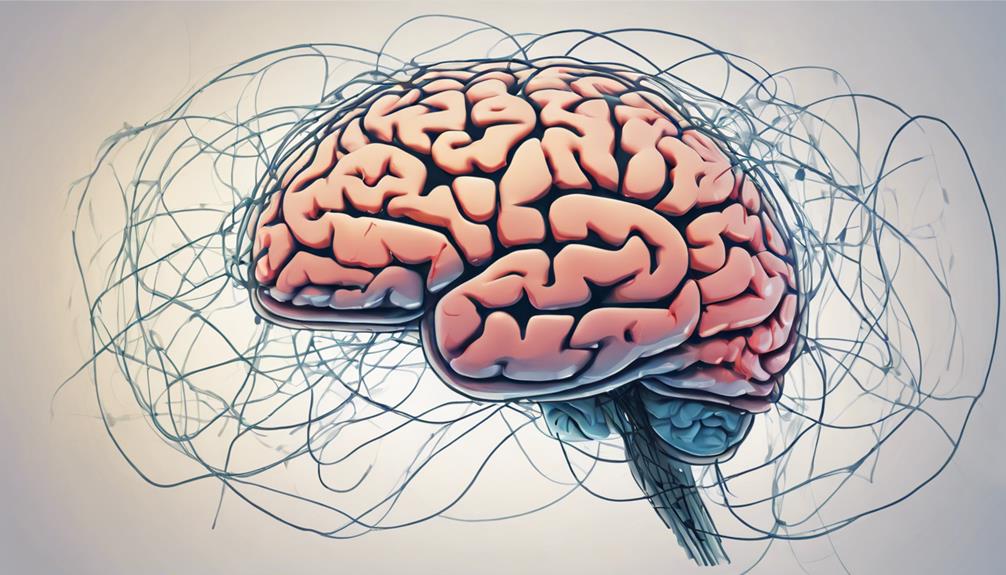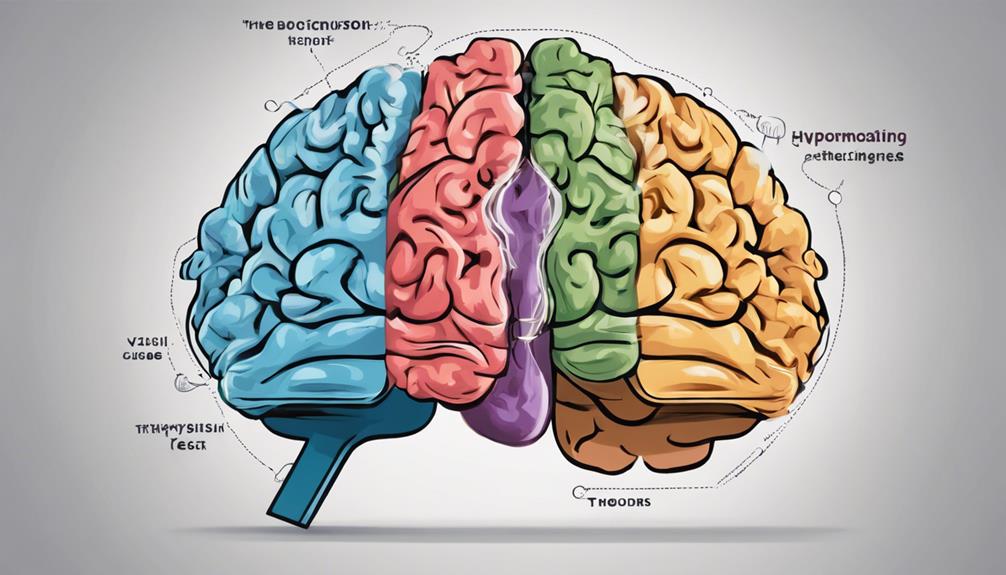Cognitive theories shape hypnosis outcomes through influencing expectations, beliefs, scripts, behavioral strategies, cognitive control, and restructuring techniques. These theories highlight the significance of cognitive processes in enhancing receptiveness, response, and therapeutic effectiveness during hypnotherapy sessions. Expectations, beliefs, and scripts set the framework for hypnotic experiences, while cognitive-behavioral approaches and restructuring techniques provide tools for positive change. Understanding the intricate interplay of cognitive factors in hypnosis can lead to optimized outcomes for individuals seeking hypnotherapy interventions.
Role of Expectations in Hypnosis

Expectations play a crucial role in shaping the outcomes of hypnosis sessions, influencing the individual's receptiveness and response to suggestions presented during the process. Expectation dynamics, rooted in cognitive biases, significantly impact how individuals experience hypnosis. Psychological preparation before a hypnosis session can prime individuals to be more open to suggestions, enhancing their cognitive processing during the session.
Research suggests that individuals with positive expectations of hypnosis are more likely to respond well to suggestions, while those with negative expectations may resist or have diminished responses. Cognitive biases, such as confirmation bias or the expectancy effect, can further reinforce the influence of expectations on hypnosis outcomes.
Individuals tend to interpret information in a way that confirms their preexisting beliefs, affecting how they perceive and react to suggestions given during hypnosis. Understanding the intricate interplay between expectations, cognitive biases, psychological preparation, and cognitive processing is essential for optimizing the efficacy of hypnosis interventions.
Influence of Beliefs on Suggestions
The beliefs held by individuals can significantly influence the extent to which suggestions presented during hypnosis are accepted and integrated into their cognitive processes. Belief impact plays a crucial role in determining the effectiveness of hypnotic suggestions.
Research suggests that individuals who hold strong beliefs in the power of hypnosis are more likely to respond positively to suggestions given during a session. These beliefs shape the individual's receptiveness to the hypnotic process and can influence the outcomes achieved.
Moreover, the influence of beliefs on suggestion acceptance is closely tied to cognitive processes. When individuals have preexisting beliefs that align with the suggestions given during hypnosis, they are more likely to incorporate these suggestions into their cognitive framework. This integration can lead to more profound hypnotic outcomes, as the individual is more receptive to the positive changes suggested during the session.
Understanding the impact of beliefs on suggestion influence is essential for maximizing the effectiveness of hypnosis in facilitating cognitive and behavioral changes.
Impact of Cognitive Scripts

An integral component of hypnosis outcomes is the impact of cognitive scripts on the receptivity and response to hypnotic suggestions. Cognitive scripts refer to the pre-existing mental frameworks individuals possess, influencing how they interpret and respond to information presented during hypnosis. These scripts are shaped by past experiences, beliefs, and expectations, impacting cognitive processing during hypnotic sessions.
Research indicates that individuals with cognitive scripts aligned with the therapeutic techniques used during hypnosis are more likely to exhibit positive responses. For instance, if a person holds a cognitive script that emphasizes relaxation and visualization as effective therapeutic tools, they may respond more favorably to suggestions that incorporate these techniques. On the contrary, conflicting cognitive scripts may hinder the effectiveness of hypnosis by creating cognitive dissonance and resistance to suggestions.
Understanding the impact of cognitive scripts allows hypnotherapists to tailor their approach to match individuals' existing cognitive frameworks, enhancing receptivity and optimizing therapeutic outcomes. By aligning hypnotic suggestions with individuals' cognitive scripts, practitioners can leverage these mental structures to facilitate positive changes and improvements in well-being.
Cognitive-Behavioral Approaches in Hypnosis
Utilizing cognitive-behavioral approaches within the context of hypnosis has been increasingly recognized as a strategic method to enhance therapeutic outcomes. Cognitive processing in hypnosis involves exploring and reshaping thought patterns, beliefs, and perceptions to facilitate positive change.
By combining cognitive restructuring techniques with hypnosis, individuals can address deep-seated beliefs or traumas that may be hindering their progress.
Behavioral modification strategies in hypnosis focus on changing maladaptive behaviors through suggestion, reinforcement, and visualization techniques. These approaches aim to replace negative behaviors with healthier alternatives, promoting sustainable change over time.
By incorporating behavioral modification into hypnosis sessions, individuals can develop new coping mechanisms and responses to challenging situations.
Research indicates that the integration of cognitive-behavioral approaches in hypnosis can lead to significant improvements in various conditions, including anxiety, phobias, and chronic pain.
The synergistic effect of addressing both cognitive and behavioral aspects can enhance the effectiveness of hypnotherapy and support long-lasting positive outcomes for individuals seeking therapeutic intervention.
Cognitive Control and Hypnotic Response

Cognitive control plays a crucial role in influencing the depth and efficacy of hypnotic response mechanisms. When individuals engage in hypnosis, their cognitive flexibility, or the ability to adapt cognitive strategies to changing situational demands, can impact their responsiveness to hypnotic suggestions.
Moreover, attentional focus, a key component of cognitive control, directs cognitive processing towards specific stimuli, influencing the individual's receptivity to hypnotic cues.
Research has shown that individuals with higher levels of cognitive flexibility tend to exhibit enhanced responsiveness to hypnotic suggestions, allowing for a more profound hypnotic experience. Additionally, the ability to maintain a heightened attentional focus during hypnosis can facilitate the integration of hypnotic suggestions into one's cognitive processes, further enhancing the effectiveness of the hypnotic intervention.
Therefore, understanding the role of cognitive control in shaping hypnotic responses highlights the importance of tailored approaches that consider individual differences in cognitive flexibility and attentional focus to optimize the outcomes of hypnotic interventions.
Cognitive Restructuring Techniques
Effective restructuring techniques aim to modify maladaptive cognitive patterns to promote more adaptive and functional thought processes. In the context of hypnosis, cognitive restructuring benefits individuals by helping them challenge and reframe negative beliefs, perceptions, and thought patterns.
By utilizing techniques such as cognitive reframing, individuals undergoing hypnosis can replace limiting beliefs with more empowering and positive alternatives, leading to improved psychological well-being and behavior change.
Hypnotic suggestion analysis plays a crucial role in cognitive restructuring during hypnosis sessions. Therapists carefully craft suggestions that target specific cognitive distortions or maladaptive thought patterns, guiding individuals towards recognizing and altering these patterns.
Through the use of tailored hypnotic suggestions, individuals can experience cognitive shifts that promote healthier cognitive functioning and emotional regulation. This process enables individuals to develop new perspectives, coping strategies, and problem-solving skills that support their overall mental health and well-being.
Frequently Asked Questions
Can Hypnosis Erase Traumatic Memories?
Hypnosis holds potential for memory modification, including addressing traumatic memories. Research suggests hypnotherapy can aid in memory reconsolidation and provide therapeutic benefits. However, individual responses vary, and further studies are needed to fully understand its effectiveness.
Do Cognitive Theories Explain Post-Hypnotic Suggestions?
Cognitive theories provide insights into how individuals process and respond to post-hypnotic suggestions. By examining cognitive scripts, researchers can understand the mechanisms behind the effectiveness of post-hypnotic suggestions and their impact on behavior and cognition.
How Do Cognitive Scripts Affect Hypnosis for Pain Relief?
Cognitive schemas play a pivotal role in pain perception during hypnosis for pain relief. By shaping individuals' emotional regulation processes, cognitive scripts influence the efficacy of hypnotic techniques, ultimately impacting the outcomes of pain management interventions.
Can Cognitive-Behavioral Therapy Enhance Hypnosis Effectiveness?
Exploring the mind-body connection, incorporating cognitive-behavioral therapy (CBT) into hypnosis can enhance effectiveness by promoting cognitive restructuring. This integration may lead to improved treatment outcomes, offering therapeutic benefits for various conditions.
Are There Risks of Losing Control During Hypnosis With Cognitive Approaches?
When considering hypnosis with cognitive approaches, the risk of losing control is minimal. Cognitive theories emphasize collaboration and empowerment, reducing the likelihood of memory erasure or unexpected outcomes. Properly conducted, hypnosis with cognitive techniques can be safe and effective.
Conclusion
In conclusion, cognitive theories play a significant role in shaping hypnosis outcomes through the influence of expectations, beliefs, cognitive scripts, cognitive-behavioral approaches, and cognitive control.
By understanding the cognitive processes involved in hypnosis, practitioners can tailor their interventions to enhance the effectiveness of hypnotherapy.
Further research in this area can provide valuable insights into how cognitive mechanisms contribute to the therapeutic benefits of hypnosis.


